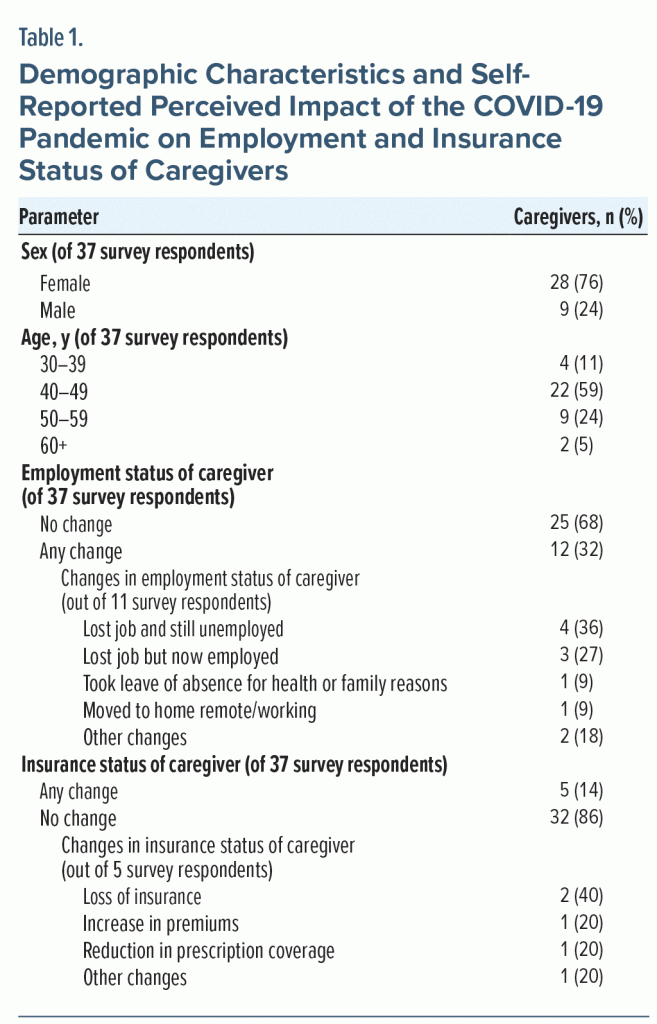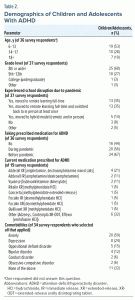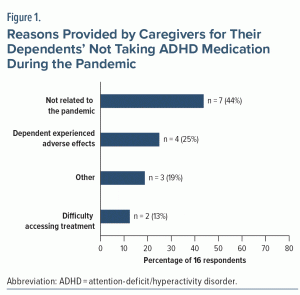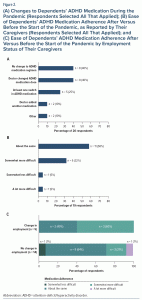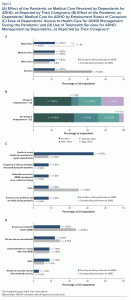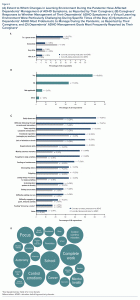ABSTRACT
Objective: To assess the perceived impact of the COVID-19 pandemic on treatment and quality of life for children and adolescents in the United States who have attention-deficit/hyperactivity disorder (ADHD).
Methods: An online survey of members of PatientsLikeMe was conducted via the health-tracking platform between March 10 and April 2, 2021. Participants were adult caregivers of dependents aged 6−18 years with diagnosed ADHD and who were taking or not taking prescription medication for ADHD.
Results: The study enrolled 37 adult caregivers of 37 children/adolescents; 36 caregivers responded to treatment questions for children/adolescents. Twenty were caregivers to dependents currently being treated for ADHD. Compared with before the pandemic, there was a decrease in the percentage of children/adolescents using prescription ADHD medication from 65% to 54% during the pandemic. At least 1 switch in ADHD medication and a dosage change were reported by 5 and 8 caregivers, respectively. Seven caregivers reported their dependents had had difficulty adhering to their medication regimen during the pandemic, which caregivers ascribed to a lack of a structured routine. Telehealth visits for their dependents were reported by 13 caregivers. None of the caregivers of dependents taking ADHD medication reported a major impact of the pandemic on ADHD-related medical care. Irrespective of treatment status, 17 caregivers reported that their dependents had ADHD management goals and agreed that the pandemic had a negative impact on progress toward those goals.
Conclusions: Many caregivers of children/adolescents with ADHD found it challenging to manage their dependents’ symptoms and treatment during the pandemic.
Prim Care Companion CNS Disord 2024;26(1):23m03587
Author affiliations are listed at the end of this article.
Attention-deficit/hyperactivity disorder (ADHD) is the most common childhood neurobehavioral disorder, with symptoms usually presenting before the age of 12 years.1 The National Survey of Children’s Health (NSCH) in 2012 found that an estimated 6.3 million children in the United States have received an ADHD diagnosis.2 ADHD is characterized by inattention, hyperactivity, and impulsivity.1 Severe symptoms can interfere with how children function socially at school and at home, as well as with academic performance.3,4 ADHD diagnosed in children often persists into adolescence, during which time hyperactivity can decline, whereas academic problems and issues in peer relationships can assume greater salience.4
Caring for a child or adolescent with ADHD can also have a considerable impact on the life and mental well-being of the caregiver.5,6 Stresses placed on caregivers of dependents with ADHD, such as change in employment status or insurance coverage, can interfere with quality of sleep, limit leisure time and social activities, and reduce happiness with relationships.5,6
According to the 2016 NSCH, approximately 69% of school-aged children with current ADHD were prescribed ADHD pharmacotherapy.1 Long-term treatment with prescribed ADHD medications that improve symptoms may help prevent the complications of ADHD persisting into adulthood and, thereby, preclude associated impairments in quality of life.7 Pharmacotherapy with caregiver training in behavior management and educational support is recommended for elementary school–aged children aged 6 to 12 years with ADHD.8 In addition, prescription medication for ADHD in combination with training interventions and behavioral support is recommended to reduce core symptoms in adolescents aged 12 to 18 years with ADHD.8
The COVID-19 pandemic has resulted in extensive societal shifts away from in-person to virtual interactions, including in academic and health care settings, which may pose unique challenges for children and adolescents with ADHD.9,10 Changes in the learning environment, daily routine, and management of ADHD, as well as disruption in access to care, may worsen symptoms and increase burden of disease in ways that affect both the individual and the caregiver.
PatientsLikeMe (PLM) is an online community health management and real-world data platform. Consenting members of PLM contribute to the database by sharing personal information and experiences about their health, symptoms, and treatments and offer peer support. The objective of the UNCOVER study (Understanding the patient experience during the COVID-19 pandemic, effects on real world quality of life, symptom management and clinical outcomes in patients treated and untreated for ADHD) was to better understand the self-reported impact of the COVID-19 pandemic on children and adolescents with ADHD through a survey of their caregivers via the PLM platform.
METHODS
Study Design
In the UNCOVER study, a 39-question, descriptive, cross-sectional survey was conducted online using the PLM platform between March 10 and April 2, 2021 (Supplementary Figure 1). Participants included in the study were recruited from adult US-resident PLM members aged ≥ 18 years who reported that they were caregivers of dependents aged 6 to 18 years with ADHD. An e-mail invitation containing a brief explanation of and a link to the electronic survey was sent to caregivers of individuals with ADHD registered on PLM. After 3 days, a reminder e-mail was sent to encourage participation. The survey was closed after 24 days. To answer the survey questions, participants were asked to consider the time between March 2020 and the time of survey. All participants provided written informed consent. No additional exclusion criteria were applied. The study included caregivers of patients taking prescription medication for ADHD (treated patients) and those not taking prescription medication for ADHD (untreated patients). The UNCOVER study protocol was approved by the WIRB-Copernicus Group Institutional Review Board on February 23, 2021. The Survey Questionnaire is provided in Supplementary Appendix 1.
Data and Statistical Analyses
The survey collected descriptive data on the experience of caregivers of young people with ADHD on their care management during the COVID-19 pandemic. The survey questions specifically sought information on the patients’ ADHD treatment and symptom management, access to medical care, and ADHD management goals. Descriptive statistics were calculated for demographics and individual survey items. Summary statistics for continuous variables included the number of respondents and mean value. Categorical variables were reported as frequencies and percentages. Categorical variables were compared using the χ2 test, and continuous variables were compared between groups using 2-sample t tests.
RESULTS
Study Participants and Prescribed Medication for ADHD
The study included 37 adult caregivers who shared their experience on care management for their dependents with ADHD during the pandemic. Caregivers were mostly women (28/37; 76%) and over the age of 40 years (33/37; 89%); measures of the socioeconomic status of participants were not included in the survey. Of the 37 respondents, 12 caregivers (32%) reported a change in employment status and 5 caregivers (14%) reported a change in insurance status during the pandemic (Table 1). Demographics of the dependents with ADHD of these caregivers are outlined in Table 2. More than half of the survey participants who responded to this question (19/36; 53%) had dependents who were aged 6 to 13 years. Most participants (25/37; 68%) were in 8th or a lower grade in school. Most caregivers (31/37; 84%) reported a disruption in their dependents’ school activity caused by a shift to remote learning.
All but 1 of the survey participants responded to further questions on managing their dependents’ ADHD before and during the pandemic. Of these 36 remaining participants, 20 reported having dependents who were taking prescription medication for ADHD (such as amphetamine, lisdexamfetamine dimesylate, or methylphenidate) at the time of the survey, while 16 had dependents who were not taking any prescribed ADHD medication (Table 2). During the pandemic, fewer caregivers reported their dependents were taking prescription ADHD medication than before the start of the pandemic (20 vs 24, respectively). Of the 16 caregivers of dependents not taking prescription medication for ADHD, 7 reported that the reason for not taking ADHD medication was not related to the pandemic, 4 reported that their dependents began experiencing adverse effects from medications during the pandemic, and 2 reported difficulty accessing treatment during the pandemic (Figure 1).
Access to Medical Care and Treatment Experience for Patients With ADHD
A quarter of the caregivers (5 of 20) with dependents taking prescription ADHD medication reported at least 1 switch in prescription ADHD medication type, and 40% (8/20) reported a prescription medication dosage change during the pandemic (Figure 2A). Seven caregivers (7/19; 37%) reported that their dependents found it “somewhat” or “a lot” more difficult to adhere to prescription ADHD medication during the pandemic than prior (Figure 2B). The lack of routine was the most frequently stated reason for difficulty adhering to ADHD medication. Among 5 caregivers who reported a change in employment status during the pandemic and had dependents taking ADHD medication, 60% (3/5) reported it was “somewhat more difficult” for their dependent to adhere to taking their medication for ADHD (Figure 2C).
Survey participants were asked to rate the effect of the pandemic on the medical care received by their dependents with ADHD, and 34 of them responded to this survey question. Four caregivers of dependents who were not taking medication for their ADHD reported that the pandemic had a major effect on the medical care that was received. However, none of the caregivers whose children/adolescents were taking ADHD medication reported a major effect of the pandemic on the medical care received by their dependents (P = .05) (Figure 3A and Supplementary Table 1). Of the 12 caregivers who had a change in employment status, a “moderate” or “major effect” of the pandemic on the medical care received by their dependents was reported by half (6/12) (Figure 3B). During the pandemic, 5 caregivers found it more difficult to access health care providers for regular appointments (Figure 3C and Supplementary Table 1), 13 reported at least 1 telehealth visit with their dependents’ provider, and 9 stated their dependents did not wish to use telehealth services (Figure 3D and Supplementary Table 1).
Management of ADHD Symptoms During the Pandemic
Survey participants were asked how they managed their dependents’ ADHD symptoms during the pandemic, and 33 participants responded. Over half of these caregivers (17/33; 52%) reported that changes in the learning experience at school had impacted the management of ADHD symptoms of their dependents “to a great extent” (Figure 4A and Supplementary Table 2). Controlling their dependents’ ADHD symptoms in a virtual learning environment was particularly challenging at specific times of the day (ie, morning, afternoon, and/or evening) for 19 caregivers (Figure 4B).
Several ADHD symptoms among the children and adolescents were identified as bothersome to manage during the pandemic by 18 caregivers (Figure 4C and Supplementary Table 2): difficulty following through on tasks and instructions (16/18), being easily distracted (16/18), poor emotional regulation (15/18), and completing tasks requiring sustained mental effort (15/18). Irrespective of their dependents’ treatment status, 17 (53%) of 32 caregivers reported that their dependents had an ADHD management goal (eg, control emotions, complete work) (Figure 4D). All 17 caregivers of children and adolescents with ADHD management goals reported a negative impact of the pandemic on their dependents’ progress toward said goals.
DISCUSSION
The UNCOVER study describes the difficulties experienced during the COVID-19 pandemic by children and adolescents with ADHD in managing their symptoms and treatment, as reported by their caregivers. Behavioral therapy, educational interventions, and prescription medications are recommended in ADHD.11 In this study, we found that ADHD prescription medication use among children and adolescents declined from 65% to 54% during the pandemic compared with the time before the pandemic started. This is similar to the decline in ADHD medications dispensed to children and adolescents (12%) between April and December 2019 versus between April and December 2020 in the US, as reported by Chua et al.12 In the absence of specific guidelines, the choice of the most appropriate prescription medication for each patient is determined by the treating clinician.11 Changes in prescribed medication dose or formulation because of suboptimal efficacy or side effects is not uncommon during treatment optimization or ongoing use. In this study, 5 (25%) of 20 caregivers reported their dependents had a switch in medication during the pandemic. A 7-year study conducted before the start of the pandemic similarly reported 24.5% of 379 children in their study population had at least 2 stimulant medications prescribed for their ADHD.13 Although not statistically significant, a higher number of caregivers whose dependents were receiving ADHD medication reported that the pandemic had no effect on the medical care their dependents received, compared with those caregivers whose dependents were not taking prescription medication for ADHD. This could be because patients with ADHD faced restricted access to health care during the pandemic, and patients taking prescription medications for ADHD were more likely to have regular follow-up appointments with their health care providers.
The COVID-19 pandemic has made it difficult for people to access health care tailored to their individual preferences.14 Changes in family circumstances may also affect the ability of the caregiver to access adequate medical care for their dependents with ADHD. Indeed, several caregivers in our study indicated they had difficulty accessing medical care for their dependents with ADHD, especially those with changes in their employment status. The reduced availability of in-person medical consultations during the pandemic due to social distancing measures and the implementation of policies in the US to increase access to telehealth services led to a sharp rise in the use of telemedicine.10,14 In our study, 13 caregivers reported their dependents with ADHD had at least 1 telehealth visit during the pandemic. However, for children and adolescents with ADHD, a structured routine in accordance with their individual preferences is important for proper treatment and management of their condition. Of 34 caregivers in our study, 9 responded that their dependents did not wish to use telehealth services during the pandemic.
The COVID-19 pandemic was associated with a range of stress factors that could lead to an increase in behavioral problems, such as disruptions to routine structure, social distancing, and financial concerns for children and adolescents with ADHD and their families.9,10 Most of the caregivers in our survey stated that their children/adolescents with ADHD faced disruption at school to accommodate remote learning during the pandemic, and such changes in learning experience had a negative impact on the management of their ADHD symptoms. Caregivers reported that their dependents with ADHD continued to experience a wide range of problematic behavioral symptoms, such as “difficulty following through on tasks and instructions,” being “easily distracted,” “tasks requiring sustained mental effort,” and poor “emotional regulation.” Such bothersome symptoms appeared to be better managed among children and adolescents who were taking ADHD medication than among those not being treated for ADHD, although this difference was not statistically significant. Nevertheless, prescription medication for ADHD as a standalone treatment may not adequately address the many mental health needs of young people with ADHD.15 Children and adolescents with ADHD will likely also require a range of nonpharmacologic interventions that are tailored to individual needs, such as educational support, cognitive-behavioral therapy, and social skills training.15
Setting attainable behavioral, academic, and social target goals as part of an overall treatment plan is recommended for children and adolescents with ADHD.16,17 Indeed, more than half the caregivers in this study reported their dependents were working toward ADHD management goals. Goals of parents/guardians for children and adolescents with ADHD vary widely but typically include areas related to the core symptoms of ADHD, such as improving inattention and reducing emotional problems.18 In addition, caregivers often report goals related to educational attainment, decreasing anxiety and depression, reducing emotional problems, and building positive relationships. In this study, caregivers most frequently reported controlling emotions, completion of schoolwork, good behavior, improvements in concentration and listening, and developing organizational skills as ADHD management goal categories for their dependents with ADHD. All the caregivers in this study reported the pandemic negatively impacted their dependents’ ability to make progress toward their ADHD management goals.
This study has several limitations. The small sample size constrained interpretation of the data. The cross-sectional design of the study did not capture changes in experiences of all children and adolescents over the course of the pandemic. Additionally, the participants were selected by convenience sampling from the PLM database. Patients using PLM are likely seeking community support and/or disorder-specific education and may be more likely than the general population to emphasize issues related to their disorder in a self-reported survey. These factors likely bias the study population and limit the representativeness of the population of caregivers of patients with ADHD. The study collected self-reported data (including self-reported diagnosis of ADHD) that were not clinically validated and potentially introduced recall bias on past events, including the time prior to and early in the pandemic. The self-reported ADHD diagnosis may have introduced issues of reliability, accuracy, and bias in reporting. Qualitative research was not used to complement the quantitative data collected from the survey responses to further probe the experiences regarding care management of children and adolescents with ADHD. These issues limit the generalizability of the findings to the overall population of children and adolescents with ADHD. All statistical results, including P values, were unadjusted, limiting the interpretation of the significance of the reported differences between the caregivers of dependents with or without prescription medication for ADHD. The study included respondents only from the US, and as such the results may not be generalizable to people outside the US. Results were purely descriptive and do not imply causality. Despite these limitations, the data suggest that disruption in routine and access to care for children and adolescents with ADHD should continue to be evaluated.
CONCLUSION
Results of this survey show that the COVID-19 pandemic may have changed care management for children and adolescents with ADHD. During the pandemic, several caregivers found it challenging to manage their dependent’s ADHD symptoms and treatment compared with before the start of the pandemic. Pandemic-related disruptions in learning structure and daily routine made it difficult for children and adolescents with ADHD to adhere to their medication regimen and make progress toward their ADHD management goals.
Article Information
Published Online: January 2, 2024. https://doi.org/10.4088/PCC.23m03587
© 2024 Physicians Postgraduate Press, Inc.
Submitted: June 20, 2023; accepted September 7, 2023.
To Cite: Raveendran S, Burke MC, Klahn K, et al. A descriptive study of the caregiver’s experience of managing care for children and adolescents with attention-deficit/hyperactivity disorder during the COVID-19 pandemic: the UNCOVER study. Prim Care Companion CNS Disord. 2024;26(1):23m03587.
Author Affiliations: PatientsLikeMe LLC, Boston, Massachusetts (Raveendran, Burke); Takeda Pharmaceuticals USA, Inc., Lexington, Massachusetts (Klahn, McCue, Roy, Martin, Sarkey).
Corresponding Author: Mary C. Burke, MD, PatientsLikeMe LLC, 6 Liberty Square, Suite 2602, Boston, MA 02109 ([email protected]).
Relevant Financial Relationships: At the time of the study, Dr Subhara Raveendran was an employee of PatientsLikeMe LLC (Boston, MA, USA) and is currently an employee of Ascendis Pharma. Anit Roy was an employee of Takeda Pharmaceuticals USA, Inc. (Lexington, MA). Karen Klahn, Maggie McCue, and Drs Martin and Sarkey are employees of Takeda Pharmaceuticals USA, Inc. (Lexington, MA). PatientsLikeMe LLC, and Takeda Pharmaceuticals USA, Inc., collaborated to perform this study. The funding was provided by Takeda Pharmaceuticals USA, Inc. (Lexington, MA).
Funding/Support: PatientsLikeMe and Takeda Pharmaceuticals, Inc. collaborated on this study. This research and the journal’s publication fees were supported by Takeda Pharmaceuticals USA, Inc., Lexington, MA.
Role of the Funders/Sponsors: The sponsor (PatientsLikeMe LLC) was involved in the study design and conduct, the analysis of the results, the generation of the manuscript, and the approval to submit the manuscript for publication.
Acknowledgments: We thank the survey respondents who participated in this study. Under the direction of the authors, editorial support was provided by Oishika Panda, PhD, and Jessica Irons, PhD (Oxford PharmaGenesis Inc., Newtown, PA), and funded by Takeda Pharmaceuticals USA, Inc. (Lexington, MA).
Supplementary Material: See accompanying pages.
Clinical Points
- The stresses caused by the COVID-19 pandemic may potentially have a negative impact on the caregiver’s management of attention-deficit/hyperactivity disorder (ADHD) for their children/adolescents.
- Caregivers of dependents with ADHD reported that they found it more difficult to manage their dependents’ ADHD symptoms and medication adherence during the COVID-19 pandemic compared with before.
- Lack of routine, a shift to a virtual learning environment, and a decrease in access to face-to-face care were cited as primary sources of difficulty in the management of dependents’ ADHD symptoms during the COVID-19 pandemic.
- Health care providers should aim to develop care plans for dependents with ADHD that include pharmacotherapy and strategies for creating a structured environment despite uncontrollable external factors.
References (18)

- Danielson ML, Bitsko RH, Ghandour RM, et al. Prevalence of parent-reported ADHD diagnosis and associated treatment among U.S. Children and adolescents, 2016. J Clin Child Adolesc Psychol. 2018;47(2):199–212. PubMed CrossRef
- Health, NSoCs. Data query from the child and adolescent health measurement initiative, data resource center for child and adolescent health website. NSCH 2011/12. Accessed September 29, 2022.www.childhealthdata.org
- Cabral MDI, Liu S, Soares N. Attention-deficit/hyperactivity disorder: diagnostic criteria, epidemiology, risk factors and evaluation in youth. Transl Pediatr. 2020;9(suppl 1):S104–S113. PubMed CrossRef
- Kieling R, Rohde LA. ADHD in children and adults: diagnosis and prognosis. Curr Top Behav Neurosci. 2012;9:1–16. PubMed
- Sikirica V, Flood E, Dietrich CN, et al. Unmet needs associated with attention-deficit/hyperactivity disorder in eight European countries as reported by caregivers and adolescents: results from qualitative research. Patient. 2015;8(3):269–281. PubMed CrossRef
- Peasgood T, Bhardwaj A, Brazier JE, et al. What is the health and well-being burden for parents living with a child with ADHD in the United Kingdom? J Atten Disord. 2021;25(14):1962–1976. PubMed CrossRef
- Di Lorenzo R, Balducci J, Poppi C, et al. Children and adolescents with ADHD followed up to adulthood: a systematic review of long-term outcomes. Acta Neuropsychiatr. 2021;33(6):283–298. PubMed CrossRef
- Wolraich M, Brown L, Brown RT, et al; Subcommittee on Attention-Deficit/Hyperactivity Disorder; Steering Committee on Quality Improvement and Management. ADHD: clinical practice guideline for the diagnosis, evaluation, and treatment of attention-deficit/hyperactivity disorder in children and adolescents. Pediatrics. 2011;128(5):1007–1022. PubMed CrossRef
- Cortese S, Asherson P, Sonuga-Barke E, et al; European ADHD Guidelines Group. ADHD management during the COVID-19 pandemic: guidance from the European ADHD Guidelines Group. Lancet Child Adolesc Health. 2020;4(6):412–414. PubMed CrossRef
- Torous J, Wykes T. Opportunities from the coronavirus disease 2019 pandemic for transforming psychiatric care with telehealth. JAMA Psychiatry. 2020;77(12):1205–1206. PubMed CrossRef
- Cortese S. Pharmacologic treatment of attention deficit-hyperactivity disorder. N Engl J Med. 2020;383(11):1050–1056. PubMed CrossRef
- Chua KP, Volerman A, Conti RM. Prescription drug dispensing to US children during the COVID-19 pandemic. Pediatrics. 2021;148(2):e2021049972. PubMed CrossRef
- Barbaresi WJ, Katusic SK, Colligan RC, et al. Long-term stimulant medication treatment of attention-deficit/hyperactivity disorder: results from a population-based study. J Dev Behav Pediatr. 2006;27(1):1–10. PubMed CrossRef
- Tarricone R, Rognoni C. What can health systems learn from COVID-19? Eur Heart J suppl. 2020;22(suppl_P):P4–P8. PubMed CrossRef
- Young S, Amarasinghe JM. Practitioner review: Non-pharmacological treatments for ADHD: a lifespan approach. J Child Psychol Psychiatry. 2010;51(2):116–133. PubMed CrossRef
- American Academy of Pediatrics. Subcommittee on Attention-Deficit/Hyperactivity Disorder and Committee on Quality Improvement. Clinical practice guideline: treatment of the school-aged child with attention-deficit/hyperactivity disorder. Pediatrics. 2001;108(4):1033–1044. PubMed CrossRef
- Fiks AG, Mayne S, Debartolo E, et al. Parental preferences and goals regarding ADHD treatment. Pediatrics. 2013;132(4):692–702. PubMed CrossRef
- McGoron L, Sturner R, Howard B, et al. Parents’ goals for ADHD care in a clinical pediatric sample. Clin Pediatr (Phila). 2014;53(10):949–959. PubMed CrossRef
This PDF is free for all visitors!
